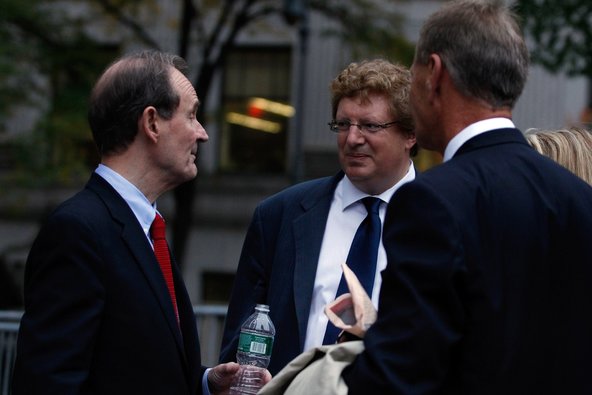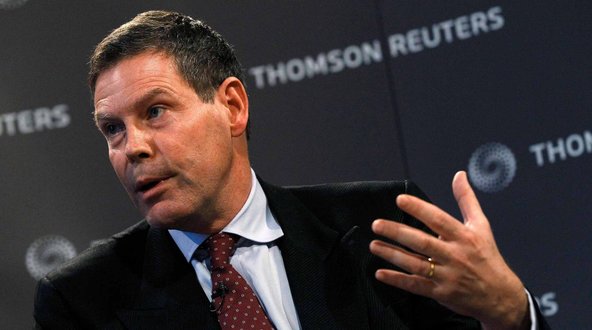 Jessica Rinaldi/ReutersGuy Hands, center, of Terra Firma Capital Partners, with his lawyer David Boies, left, outside Manhattan Federal Court in 2010.
Jessica Rinaldi/ReutersGuy Hands, center, of Terra Firma Capital Partners, with his lawyer David Boies, left, outside Manhattan Federal Court in 2010.
The British financier Guy Hands will have another chance to try to prove his claim that he was defrauded by his longtime bankers at Citigroup.
A federal appeals court on Friday ordered a new trial in the legal fight between Mr. Hands and Citigroup over the buyout of the music company EMI.
The United States Court of Appeals for the Second Circuit in Manhattan vacated a 2011 jury verdict that cleared Citigroup of any wrongdoing in its role in EMI’s sale to Mr. Hands’s private equity firm, Terra Firma Capital Partners. It ruled that improper jury instructions from the trial court judge required a reversal.
Mr. Hands had accused the bank of defrauding him during its handling of an auction of EMI. He said that a Citigroup investment banker lied to him about another bidder, which tricked him into paying $6.8 billion for EMI at the market peak in August 2007. After the financial crisis struck and the music industry slumped, Mr. Hands lost billions of dollars on the investment.
Related Links
He sued Citigroup in federal court, seeking $8.3 billion in damages. The bank said it had done nothing wrong and accused Mr. Hands of having a bad case of buyer’s remorse.
After a three-week trial in 2010, the jury awarded nothing to Mr. Hands. Citigroup, which had also provided Mr. Hands with billions of dollars of loans to pay for EMI, ultimately took ownership of the company and sold it off in pieces. The Universal Music Group, a division of Vivendi, bought EMI’s recorded-music business, and a Sony-led group acquired EMI’s publishing assets.
With EMI seized from Terra Firma and now with new owners, the revived dispute becomes a fight over money. Should Citigroup and Mr. Hands fail to reach a financial settlement, the case will again go to trial before Judge Jed S. Rakoff, who presided over the case. A spokeswoman for Citigroup, Danielle Romero-Apsilos, suggested that was where they were heading.
“We are confident we will again prevail at trial as Citi’s conduct in the EMI transaction was entirely proper,” Ms. Romero-Apsilos said. “The original verdict made clear that Terra Firma’s baseless accusations of fraud were simply an attempt to gain leverage in debt restructuring negotiations.”
The reversal of a jury’s verdict in a civil dispute is rare, and the federal appeals court said it was loath to overturn the case.
“We are particularly reluctant to overturn a jury verdict when, as here, it appears that both parties have had a fair bite at the proverbial apple,” wrote Judge John M. Walker Jr., who wrote the opinion for a unanimous three-judge panel. “The principal actors on both sides provided their version of events, exceptional trial lawyers marshaled and clarified the evidence, and a gifted judge presented the issue to the jury for its evaluation.”
Despite the praise for Judge Rakoff, the court said that he erred in his description of English law related to fraudulent misrepresentation, which applied to the case. Judge Rakoff incorrectly told the jury that Terra Firma had the burden of proof in showing that it relied on Citigroup’s supposed misrepresentations, when according to English law, the burden fell upon Citigroup to prove that it did not lie.
“The district court’s jury instructions were based on an inaccurate understanding of the relevant English law,” Judge Walker wrote.
Terra Firma, through its spokesman, Jonathan Doorley, said, “We continue to believe that we have a strong claim, and with the jury instructions now resolved in our favor, we expect to prevail in any subsequent trial.”
The decision is a victory for Mr. Hands’s star lawyer, David Boies of Boies, Schiller Flexner, who represented him at trial and argued the appeal. If the case is tried again, Mr. Boies will most likely find himself in a rematch against Citigroup’s lawyer, Theodore V. Wells Jr. of Paul, Weiss, Rifkind, Wharton Garrison.
Article source: http://dealbook.nytimes.com/2013/05/31/appeals-court-revives-financiers-suit-against-citigroup/?partner=rss&emc=rss


